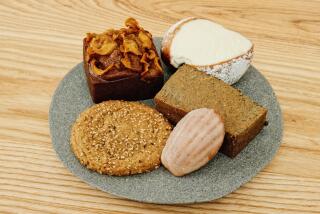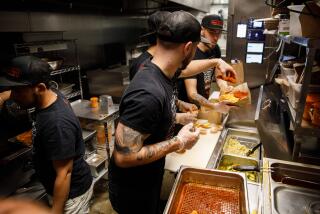Can Not Too Hot, Not Too Cold Be Just Right?
They’re as integral to Vietnamese and Chinese holidays as turkey is to Thanksgiving.
One consists of rice cake sopping in the juices from fatty pork, tucked into leaves and tied together like a present. Another is a hockey puck-size mound of delicate brown crust wrapped around a rich lotus paste and a duck egg yolk.
In recent years, however, moon cakes and other delicacies have become targets of food inspectors, who have cited merchants for allowing the treats to sit at room temperature for more than four hours, potentially allowing bacteria to accumulate.
The rules have caused culinary skirmishes in bakeries and eateries in San Gabriel, Little Saigon and other Asian enclaves around Southern California, with connoisseurs balking at the suggestion of government officials to freeze the pastries or, worse, place them under heat lamps. The bakers say these ideas are akin to boiling a pumpkin pie.
But in an act of culinary cultural sensitivity, the state Senate and Assembly this week came to the aid of the delicacies, ordering state health officials to determine whether the pastries can safely be kept at room temperature for much longer than four hours. When the tests are completed, officials would then set new standards.
“The contention of retailers and consumers is, ‘We’ve been eating these foods for thousands of years, and nobody is getting sick. Why the stringent requirements, then?’ ” said Assemblyman Van Tran (R-Garden Grove), who proposed the legislation. “You have to find a balance between public health and history and culture. It’s a classic American story.”
Asian restaurants have long battled health inspectors over the temperature at which famous dishes like Peking duck and Korean rice cakes are served. But this marks a rare case in which legislators have intervened in an attempt to protect an ethnic food.
Tran’s staff even brought platters of the delicacies into the Capitol during a meeting with officials earlier this year. They served the cakes and pastries at room temperature, and the crowd gobbled them up.
Tran’s bill, which won overwhelming approval in both houses and is now before Gov. Arnold Schwarzenegger, covers three delicacies: moon cakes -- the dense, lotus seed pastries popular both in Chinese and Vietnamese dining -- and the Vietnamese pork and green bean rice cakes, banh chung and banh tet.
All three are sold at bakeries, grocery stores and restaurants, where they often sit at room temperature for hours, if not days. Bakers and diners alike say this storage method is crucial to maintaining the texture and moistness of the food.
But health officials have become more aggressive about examining the pastries. They’re concerned that storing the food for so many hours at room temperature puts it in the “bacteria danger zone” -- between 41 and 135 degrees.
Orange County health officials last year shook up Little Saigon by ordering that the products could not be stored at room temperature for more than four hours. “Four hours is the basic amount of time it takes for bacteria growth,” said Jim Miller, a program manager for the Orange County Health Care Agency.
The rules have been followed only sporadically, many merchants say. And for those who try, it has proved to be a hassle.
“Americans have turkey for Thanksgiving,” said Thuy Pham of Kim Huong Bakery in Westminster. “We need banh chung to call it Tet,” the Vietnamese lunar new year.
Pham’s banh chung is so popular that customers place orders months ahead of Tet. Since the crackdown, she said, she has had to hire more deliverymen so her goods can be stocked in stores before the four hours expire.
She said there have been times when she’s thrown away half her inventory because the four-hour limit expired before she could sell the food.
Pham and other merchants insist that the food can stay out for days without causing illness. But some customers say they know otherwise.
Kelly Huynh, shopping at a grocery store in Westminster, said she believed that some stores leave the delicacies out for too long, adding that she has been sickened from spoiled Vietnamese pastries and cakes.
Health officials in both Orange County and Los Angeles said Thursday that they would welcome an easing of the restrictions as long they fall within whatever time limit the state’s research determines is safe.
Though the legislation’s passage has brought cheers in local Vietnamese and Chinese food circles, some warn that connoisseurs can go too far in preserving ethnic cooking.
“They have to realize we live in America,” said Korey Chong, a food safety consultant based in Commerce.
“And we live a lot longer.”
*
More to Read
Eat your way across L.A.
Get our weekly Tasting Notes newsletter for reviews, news and more.
You may occasionally receive promotional content from the Los Angeles Times.











